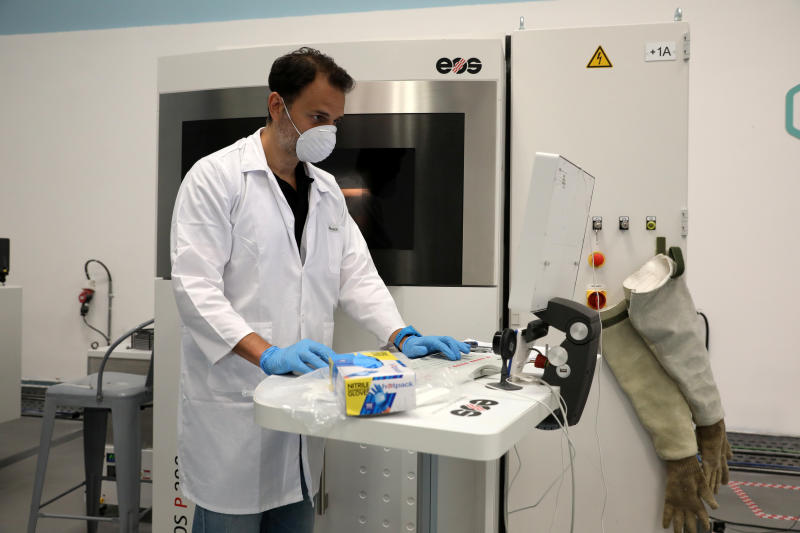
Fahmi Al-Shawwa, CEO of Immensa Technology Labs, uses a 3D laser printer to produce components for face shields, following the outbreak of the coronavirus disease (Covid-19), in Dubai, United Arab Emirates, March 30, 2020. [Reuters]
As researchers work round the clock trying to understand the origin of the novel coronavirus which will help them develop a vaccine against it, the scourge continues to ravage humanity across the world.
As of March 31, more than 780,000 people had been infected in more than 180 countries, according to the data from Worldometer, an online-based global statistics tracker.
There have been over 37,000 deaths globally. Over 3,000 of those deaths have occurred in mainland China, where the coronavirus was first reported in the city of Wuhan.
Italy has been the hardest-hit country with over 11,000 fatalities while Spain has seen more than 7,700 deaths.
The US now has over 164,000 confirmed cases, the highest count in any country globally.
In Kenya, as of March 30, 50 confirmed cases of Covid-19 had been reported.
The Health Ministry estimates Kenya will have 1,000 coronavirus cases by the first week of April and will have 5,000 cases by mid-April and, potentially, 10,000 cases by April 30.
The highly contagious disease has put several countries on the edge as they try to contain it.
The Centres for Diseases Control and Prevention (CDC) has recommended the following measures if a patient is exhibiting mild to severe symptoms of the virus.
Stay at homeThe Health Ministry urges Kenyans to stay at home unless on essential business in order to curb the spread of Covid-19.
CDC also advises that those infected with the virus and have mild symptoms to stay at home as they are able to recover while at home without medical care.
“Stay in touch with your doctor. Call before you get medical care. Be sure to get care if you have trouble breathing, or have any other emergency warning signs, or if you think it is an emergency,” CDC says adding that public transportation should be avoided at all cost.
“As much as possible, you stay away from others. You should stay in a specific room if possible, and away from other people in your home. Use a separate bathroom,” it adds.
Face masksFace masks should be used by sick people when around others and caregivers of those infected with the virus.
“If the person who is sick is not able to wear a facemask (for example, because it causes trouble breathing), then as their caregiver, you should wear a facemask when in the same room with them. Visitors, other than caregivers, are not recommended,” CDC says.
Cover your coughs and sneezesThe virus is transmitted from person to person via droplets that come from the nose or mouth when an infected person coughs or sneezes. Those droplets can directly enter the nose, mouth or eyes of a person standing close by, or they can be indirectly transmitted by hands and inanimate objects.
CDC advises the patients to cover their mouth and nose with a tissue when one coughs or sneezes.
“Dispose of the used tissues in a lined trash can and immediately wash your hands with soap and water for at least 20 seconds. If soap and water are not available, clean your hands with an alcohol-based hand sanitizer that contains at least 60 per cent alcohol.”
Washing hands and use of sanitisers should be done regularly to curb the spread of the respiratory illness.
Avoid sharing personal household itemsIf infected with Covid-19, do not share dishes, drinking glasses, cups, eating utensils, towels or beddings with other people in your home.
Thorough washing of these items after they have been used is highly recommended.
Clean all “high-touch” surfaces every dayCaregivers should clean and disinfect all the high-touch surfaces in the isolation area (“sick room” and bathroom) every day.
The high-touch surfaces include phones, remote controls, counters, tabletops, doorknobs, bathroom fixtures, toilets, keyboards, tablets, and bedside tables.
“If a caregiver or other person needs to clean and disinfect a sick person’s bedroom or bathroom, they should do so on an as-needed basis. The caregiver/other person should wear a mask and wait as long as possible after the sick person has used the bathroom,” CDC states.
Signs and symptomsAccording to World Health Organisation (WHO) as of February 20, 2020 and based on 55, 924 laboratory-confirmed cases, typical signs and symptoms include fever, dry cough, fatigue, sputum production, shortness of breath, sore throat, headache, myalgiaor arthralgia, chills, nausea or vomiting, nasal congestion, diarrhoea, and hemoptysis and conjunctival congestion.
“People with Covid-19 generally develop signs and symptoms, including mild respiratory symptoms and fever, on an average of 5-6 days after infection (mean incubation period 5-6 days, range 1-14 days),” WHO states.
You can use this tool https://www.standardmedia.co.ke/covid19/ for self-assessment on coronavirus symptoms.
 The Standard Group Plc is a multi-media organization with investments in media
platforms spanning newspaper print
operations, television, radio broadcasting, digital and online services. The
Standard Group is recognized as a
leading multi-media house in Kenya with a key influence in matters of national
and international interest.
The Standard Group Plc is a multi-media organization with investments in media
platforms spanning newspaper print
operations, television, radio broadcasting, digital and online services. The
Standard Group is recognized as a
leading multi-media house in Kenya with a key influence in matters of national
and international interest.











